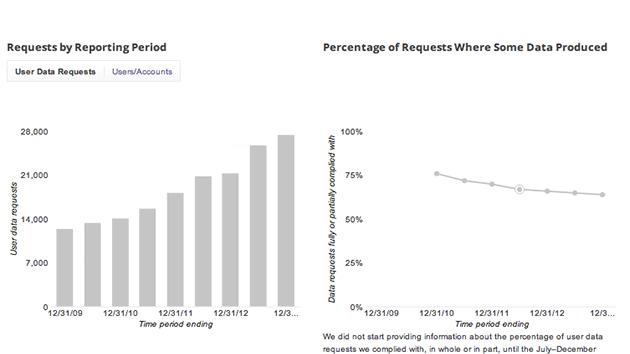Google Transparency Report
Latest

Google transparency report: government requests up 120 percent since 2009
Google's been publishing transparency reports since 2009, but its disclosure of government requests has become especially interesting in the aftermath of revelations about PRISM and NSA surveillance. The company's ninth report, released today, details a significant jump in requests for user information. Since the first report, the volume of government requests has increased by about 120 percent. Meanwhile, the percentage of requests where Google actually supplied user information has decreased slightly, to 64 percent in 2013 versus 76 percent three years earlier. Google also notes that, as its number of users increases, so does the number of governments that exercise their authority to request information. In response, Mountain View's transparency reports now include countries that make less than 30 requests during a period in addition to those that make 30-plus requests. Among the former group, you'll find entries such as Bulgaria, Lichtenstein and even Vatican City, all three of which made only one request for user data between July to December 2013. Finally, Google's responded to users' questions about its response to search warrants with a live-action animation. Check it out below.

Google Transparency Report: government takedown requests are on the rise
Google's Transparency Reports shed light on how often governments across the globe request the removal of content, and the company's latest is especially interesting given the intense focus on the NSA's data-snooping policies and the government(s) behind them. You see, it appears that countries don't like coming under scrutiny online -- how else could you explain the 68-percent increase in removal requests in the first half of 2013 compared to the second half of 2012? That number comes courtesy of Google's latest report, its eighth since the first was released in 2010. Unsurprisingly, much of the content targeted for takedown is political in nature: Google says governments continually want to scrape unflattering coverage, from video footage that reflects badly on police departments to criticism of judges. Both Russia and Turkey, in particular, increased their removal requests in the first half of the year, both in response to online criticism of national laws. Mountain View hasn't rolled over completely, though; it says it removed less than one third of content targeted in these requests. There's plenty of other data to dig through, if you're interested -- check out the source link below.

Google reveals government censorship requests are on the rise
Google's updated its transparency report to show how many times governments worldwide sought to censor search results, drop YouTube videos or look at user data in the second half of last year. Each request is logged and detailed, with the most filings coming from the US, UK and India. The requests varied from censoring a video where a Canadian citizen creatively destroyed his passport (not complied with) through to blogs promoting hate speech and violence (complied with). Mountain View's list makes for interesting reading, but it's not all bad news: where videos were merely critical or satirical of the local authorities, the search giant refused to pull 'em, respecting private citizens right to free speech in a great majority of cases.

